Has a problem been found?

Repair as necessary and go to "Verification of Vehicle Repair" procedure.

Go to " Power Circuit Inspection " procedure.
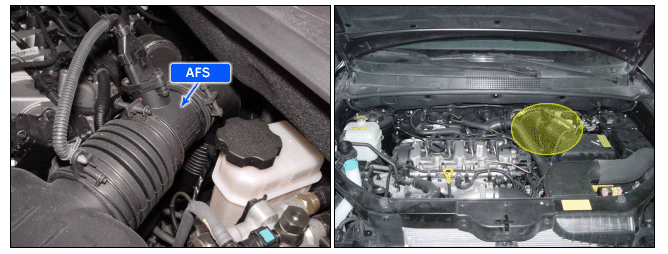
MAFS (Mass Air Flow Sensor) has an intake air temperature sensor built-in and is located between the air cleaner assembly and the throttle device. The MAFS uses a hot film type sensing-element to measure the mass of intake air entering the engine. And send the signal to ECM.
A large amount of intake air represents acceleration or high load conditions while a small amount of intake air represents deceleration or idle.
The ECM uses this information to control the EGR solenoid valve and correct the fuel amount.
If the signal is below threshold value, the ECM judged this as a fault and DTC is set.
Item | Detecting Condition | Possible Cause |
DTC Strategy | ● Signal check, low | ● open in power circuit ● short to ground in signal circuit ● open in ground circuit ● Faulty MAFS ● Faulty ECM |
Enable Conditions | ● Engine run | |
Threshold Value | ● Output signal < - 25 kg/h | |
Diagnostic Time | ● 1 sec. | |
MIL Fuel Limit Fuel Cut EGR Off | ● Yes ● Yes ● No ● Yes | |
Fail safe | ● EGR valve deactivited ● Fuel quantity limitation |
MAFS | Idle Position (without EGR) | Idle Position (with EGR) |
Mass air flow | 450~550 mg/stroke | 280~360 mg/stroke |
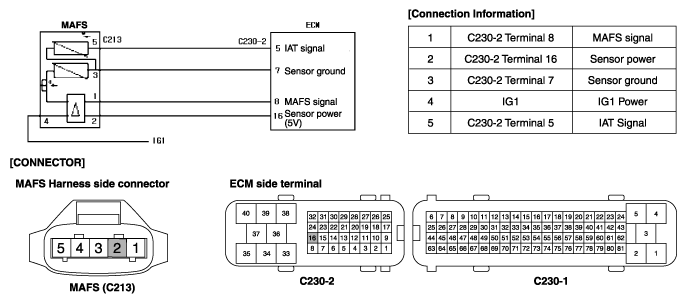
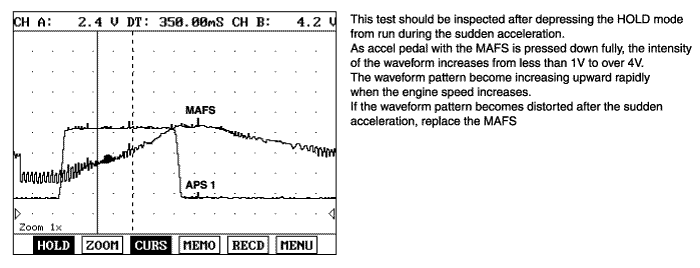
Ignition "OFF" & Engine "OFF".
Install Scantool and Engine "ON ".
Monitor that Current data is changing without EGR actuator operation or with EGR actuator operation while idling engine speed.
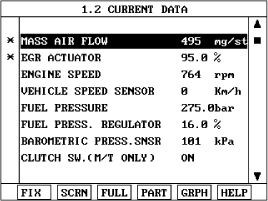
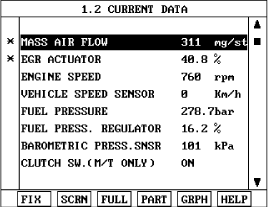
Fig 1) Normal value without EGR actuator : Approx. 450 ~ 550 mg/stroke
Fig 2) Normal value with EGR actuator : Approx. 280 ~ 360 mg/stroke
Is Current data displayed correctly ?

▶ Fault is intermittent caused by poor contact in the sensor’s and/or ECM’s connector or was repaired and ECM memory was not cleared. Thoroughly check connectors for looseness, poor connection, bending, corrosion, contamination, deterioration, or damage. Repair or replace as necessary and go to "Verification vehicle Repair" procedure.

▶ Go to "W/Harness Inspection" procedure.
Many malfunctions in the electrical system are caused by poor harness and terminals.
Faults can also be caused by interference from other electrical systems, and mechanical or chemical damage.
Thoroughly check connectors for looseness, poor connection, bending, corrosion, contamination, deterioration, or damage.
Has a problem been found?

Repair as necessary and go to "Verification of Vehicle Repair" procedure.

Go to " Power Circuit Inspection " procedure.
Check for short in harness.
Ignition "OFF".
Disconnect MAF sensor connector.
Ignition "ON" & Engine "OFF".
Measure voltage between terminal "4" of the sensor harness connector and chassis ground.
Specification : Approx. B+
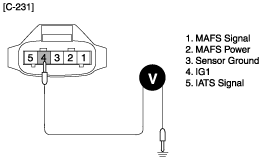
Is the measured voltage within specifications ?

▶ Go to " Signal Circuit Inspection" procedure.

▶ Check for open in polwer (IG1) harness.
Repair as necessary and go to "Verification vehicle Repair" procedure.
Ignition "OFF".
Disconnect MAF sensor connector and ECM connector.
Ignition "ON" & Engine "OFF"
Measure voltage between terminal "1" of the MAF sensor harness connector and chassis ground.
Specification : Approx. 5V
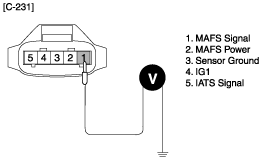
Is the measured voltage within specifications ?

▶ Go to "Ground Circuit Inspection" procedure.

▶ Check for short to ground in signal harness.
Repair as necessary and go to "Verification of Vehicle Repair" procedure.
Ignition "OFF".
Disconnect MAF sensor connector and ECM connector.
Measure resistance between terminal "3" of the sensor harness connector and terminal "7" of ECM harness connector.
Specification : Approx. below 1Ω
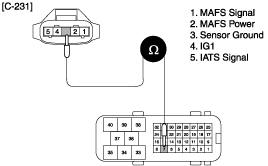
Is the measured resistance within specifications ?

▶ Go to "Component Inspection" procedure.

▶ Check for open in ground harness.
Repair as necessary and go to "Verification of Vehicle Repair" procedure.
Visual Inspection
Ignition "OFF" & Engine "OFF".
Check that arrow mark on the MAFS is indicating correct direction.
Check any contamination, corriosion or damage on connector.
Check that air cleaner is clogged or wet.
Check that MAFS cylinder is deformed, blocked by any foreign material or contaminated.
Hot film is seriously damaged by foreign material or moisture.
Is the MAFS visually O.K ?

▶ Go to "Check MAFS" as below.

▶ Substitute with a known-good MAFS and check for proper operation.
If the problem is corrected, replace MAFS and then go to "Verification of Vehicle Repair" procedure.
Check MAF.
Engine "ON".
Warm up the engine to normal operating temperature.
Check any leakage on intake system(Leakage or damage on intercooler hose).
Check that EGR does not operate around 90sec elasped after sudden accelleration.
If necessary, disconnect EGR vaccum hose.
Monitor "MASS AIR FLOW" parameter on the CURRENT DATA.
Specification : 500mg/st ± 50mg/st
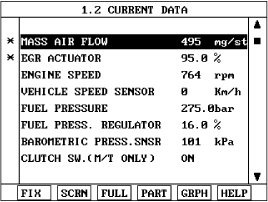
Is current data displayed correctly ?

▶ Thoroughly check connectors for looseness, poor connection, bending, corrosion, contamination, deterioration, or damage. Repair or replace as necessary and go to "Verification of Vehicle Repair" procedure.

▶ Substitute with a known-good MAFS and check for proper operation.
If the problem is corrected, replace MAFS and then go to "Verification of Vehicle Repair" procedure.
After a repair, it is essential to verify that the fault has been corrected.
Connect scan tool and select "Diagnostic Trouble Codes(DTCs)" mode and then clear DTC.
Operate the vehicle within DTC Enable conditions in General information.
Are any DTCs present ?

Go to the applicable troubleshooting procedure.

System is performing to specification at this time.